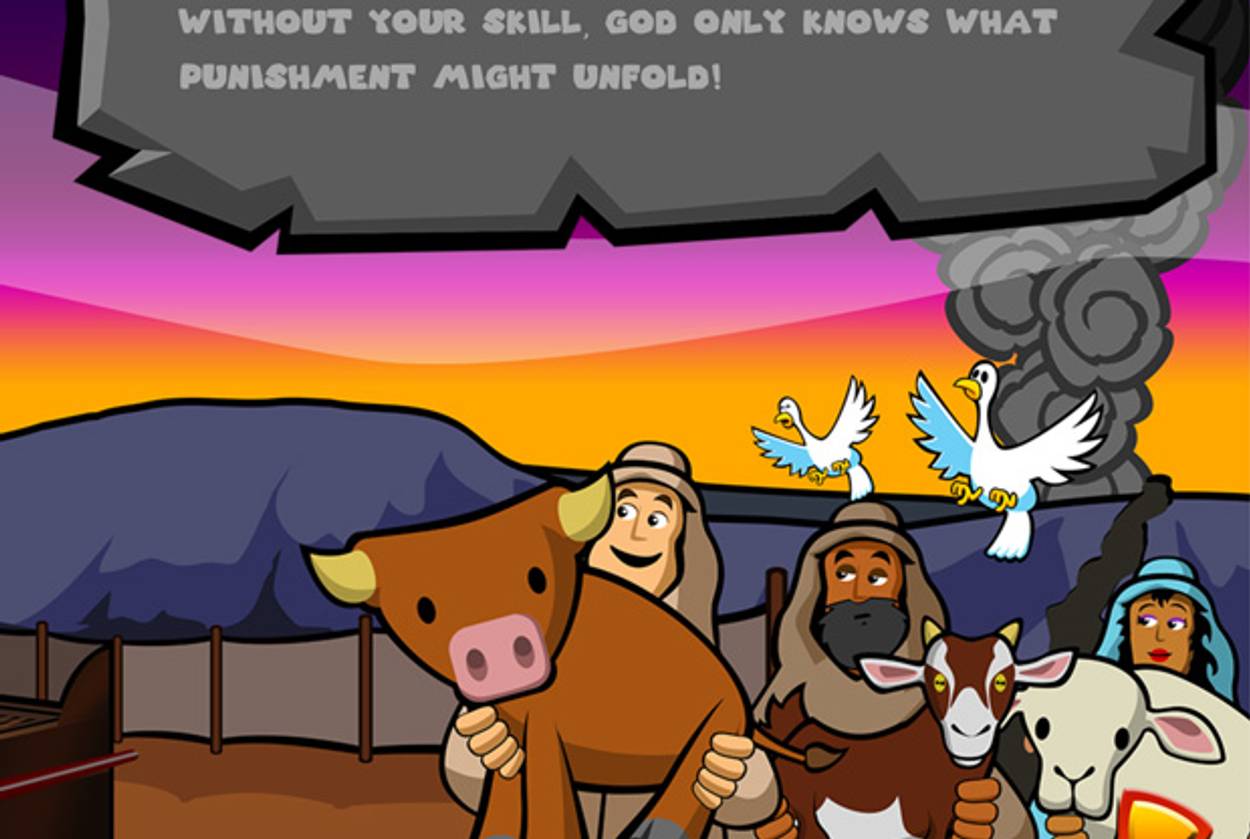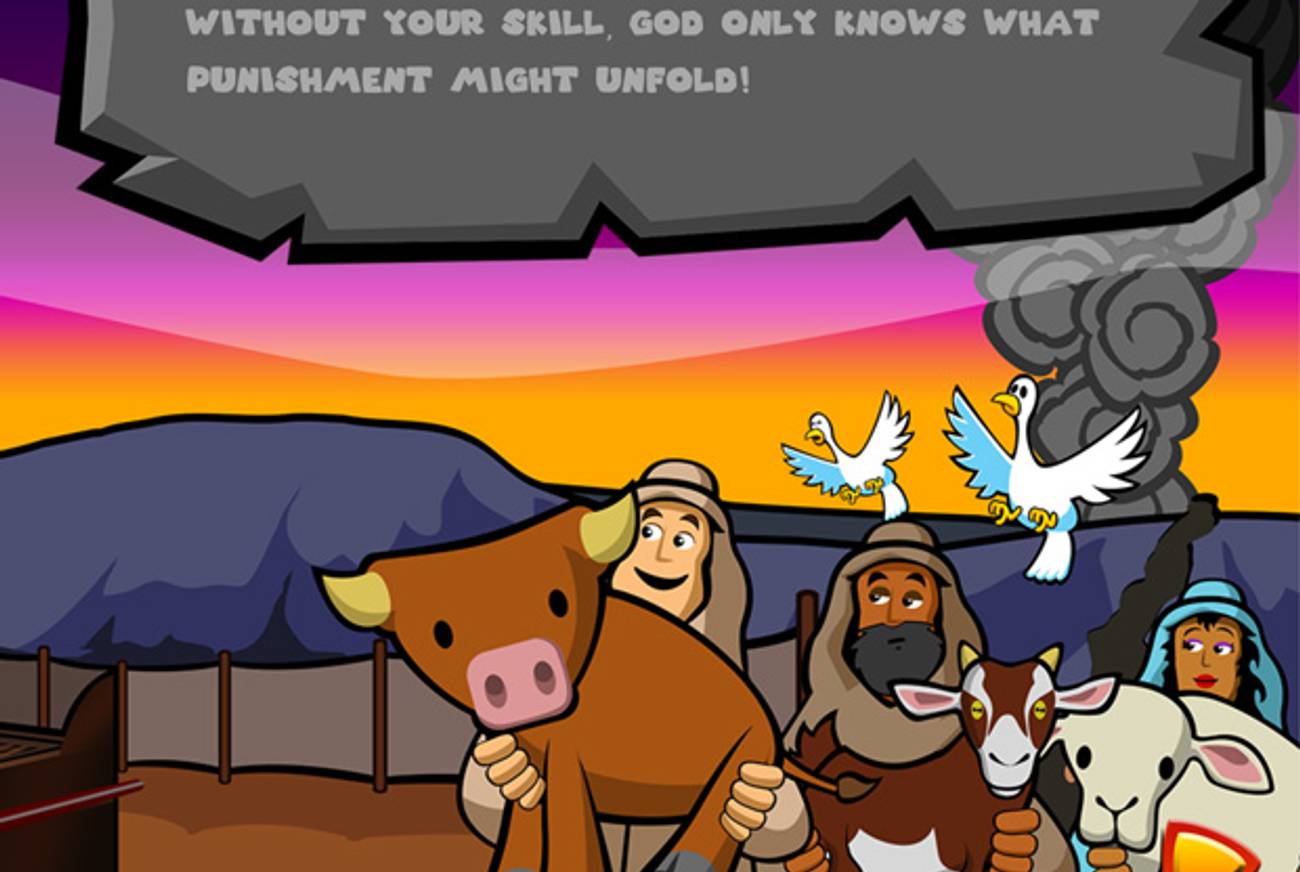Leviticus, the Video Game
A new iPhone game turns the Bible’s most detailed book into fast-paced, educational entertainment




As the game begins, cartoon animals go flying in the air, and players must slash their throats by swiping a finger across the screen. Like many similar video games designed for the iPhone and the iPad—most notably the ubiquitous Fruit Ninja—this new game, too, is fast, fun, and unremitting: one misguided touch and it’s all over. But play for a moment or two, and you realize that the game’s rules—blemished animals must be spared, doves must be sacrificed by the pair—were set in place by the grandest designer of them all: The game you’re playing is based on the Bible’s most intricately detailed book.
Titled Leviticus!, the game, as its title suggests, is both irreverent and deeply faithful to the source text—all that business about doves and cows and purity is right there in the book. But whereas Leviticus is too thick with rules to make for a very compelling read, it’s perfect when played.
This insight came to the game’s creator, Sarah Lefton, in shul. It was Yom Kippur, and she was davening but feeling not only hungry but burned out. Leafing through the machzor, she stumbled across a reading from Leviticus 16, detailing the high priest’s obligations on Judaism’s holiest day. Lefton—the executive director of G-dcast, a nonprofit that produces animated shorts of biblical texts designed as educational tools—read on, fascinated. It didn’t take long for the epiphany to hit her.
“The whole book is a series of rules,” she said. “It’s all about how the priest should do this but shouldn’t do that, and if he did something a certain way, something will happen, and if he didn’t, it won’t. It’s just a bunch of rules with rewards and punishment, and that’s what games are.”
From that point on, Lefton was a woman possessed. As soon as the holy day ended, she took out a sheet of paper and a Bible and started diagramming Leviticus. Just like any game designer would do, she jotted down sequences of rules and the consequences for breaking them; before long, the game was ready, at least on paper. Translating the ancient book into a modern video game, Lefton was thrilled to discover, wasn’t much of a challenge. Leviticus’ obsession with tumah, for example, or uncleanliness, was captured by applying a meter—accumulate too much of the forbidden stuff and you’re dead, a design principle many video games have in common.
But Lefton’s imagination was one thing and her budget another. With a modest grant from the Jewish Community Federation of San Francisco—the game, Lefton estimated, cost no more than $20,000 to make—she pared down her ambitions and got to work. Gone were the tumah meter and other whistles and bells. In its leaner iteration, the game was all about memorizing which animals were right for the altar and acting swiftly on that knowledge. The tagline said it all—“make your way through the priestly day.”
Which, in turn, meant that the team she eventually hired to work on the game had to wise up to the Bible’s exacting logic. “That’s the craziest part of it,” Lefton said. “We hired this company of three coders and one illustrator, none of whom were Jewish, and they learned so much Torah working with us. They’d draw something, and I would say, ‘Well, to make this cow truly blemished, it needs to look like this.’ It was strange.”
A similar Torah-learning experience awaits the player. Released last month, the game, available as a free download on Apple’s app store, begins by providing brief and humorous explanations about its intricate rules and then launches into a cartoonish ritualistic bloodletting. A few minutes into the game, somewhere in between beheaded sheep and smashed carafes of olive oil—together with bags of flour, another acceptable offering—the logic of Leviticus sinks in. The book, after all, is all about ritual, and ritual, as myriad thinkers have noted, is, at heart, an intricate process designed to affirm a group’s sense of belonging. When players of Leviticus! learn, for example, that swiping at that pig casually making its way across the screen means an automatic game over, this question of belonging arises in full force: Nothing delineates the boundaries of identity more sharply than being forced to make rapid, personal choices, even seemingly trivial and symbolic ones like whether or not to sacrifice a virtual pig in a video game. Put simply, to keep the game going, the player chooses not to touch that pig, and, by doing so, recalls that we’re the people who find pigs impure. This is how ritual works; it’s also the fundamental structure of good education.
And education is at the heart of Lefton’s efforts. The game, she hopes, will do more than just amuse. “We brought something to very visual life that’s normally left on the page,” she said, “and that a lot of people just never study.” Believing that Jewish literacy and digital literacy make for excellent bedfellows—learning how to code and create applications that, in turn, are designed to enhance Jewish education and engagement—she now has future plans that involve not only the production of more games like Leviticus!, but also workshops teaching students and educators how to create their own Jewish-themed software.
“We need to start a Jewish Code for America,” Lefton said, referring to the not-for-profit often described as the tech world’s equivalent of the Peace Corps and that aims to enable web industry professionals to volunteer their time teaching programming around the nation. For followers of a religion so deeply dedicated to exploring the spaces and possibilities that emerge from within a code-like rigid set of rules, this is an urgent and highly appealing proposition. In the meantime, however, we could all kick back, fire up our iPhones, and unleash our inner knife-wielding priest.
***
Like this article? Sign up for our Daily Digest to get Tablet Magazine’s new content in your inbox each morning.
Liel Leibovitz is a senior writer for Tablet Magazine and a host of the Unorthodox podcast.
Liel Leibovitz is editor-at-large for Tablet Magazine and a host of its weekly culture podcast Unorthodox and daily Talmud podcast Take One. He is the editor of Zionism: The Tablet Guide.